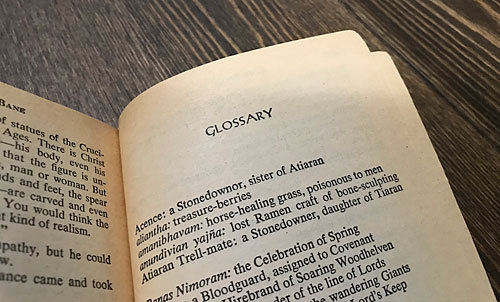We are all well-aware of the common need for a nonfiction book to contain a glossary, particularly if it is a dense scientific tome or references many different indigenous peoples like Ooligan Press’s release Tribal Histories of the Willamette Valley.
But when researching whether to put a glossary in my urban fantasy/supernatural thriller book series, The Ghost and the Mask, which contains some made-up words as well as Japanese terms that would be unfamiliar to most readers, I discovered that there is a vocal contingent of people out there who hate glossaries, who even think they are a sign of bad writing.
This was surprising to me, to say the least. After all, as a longtime reader of fantasy and science fiction, I happen to love glossaries. All that extra stuff that writers like Tolkien, Herbert, and Donaldson put in their books: the maps and appendices. Those are nothing less than joy for me. It’s extra stuff for me to devour when the book is great. And well, stuff for me to ignore when it’s not so great.
But is there merit to the criticism? To be honest, all of the disparaging comments I could find were from forums like Reddit or in personal book reviews. I could not find any anti-glossary sentiment from well-known voices, but there was enough sentiment and a particular through line from the no-glossary contingent that makes it worthy of consideration.
The general consensus from the detractors is that the writing should stand on its own, and therefore a glossary is not needed. I couldn’t agree with this more. You should not have to interrupt your reading experience to check a glossary. As user carryontothemoon said on Reddit, “If there’s something I really need to know, I should be able to figure it out from an explanation in the text or from context.” In most cases, this is absolutely true. On the first introduction of a new term, it should be clear in context. Some readers aren’t gifted with perfect memory, however, (ahem . . . me) and it’s nice to be able to get a quick refresher later on in the book. If you are not that kind of reader, it’s a simple thing to just not look at the glossary.
NiennaC on AbsoluteWrite’s forum wrote that they found a book “incredibly frustrating because the author barely ever explained the fantasy terms . . . and instead, directed the reader to the glossary.” I can see how complete reliance on the glossary could be upsetting. There are, however, some authors that intentionally leave you in the dark as to the meaning of their invented words, such as in Anthony Burgess’s A Clockwork Orange, which can leave you a little dizzy from trying to decipher it. This is what Brian Staveley calls the Fuck You Method in his article about glossaries in speculative fiction. Ultimately, with a book like that, you just have to let yourself be immersed in the experience. My edition of A Clockwork Orange has no glossary, which, according to The International Anthony Burgess Foundation’s website, is as the author intended, although later editions do include one.
Some of these complaints are understandable, but to make the leap from some authors not explaining their terms during the narrative to assuming all books with glossaries must be poorly written, as this review of David Louis Edelman’s award-winning book Infoquake does, feels pretty unreasonable, to say the least. There are plenty of fantastic writers who include glossaries in their books: N. K. Jemisin and S. A. Chakraborty, for example.
The good news is it seems that most readers out there, particularly fantasy and sci-fi readers, appreciate a glossary. Even those forums linked above are full of glossary lovers like myself. So, if you’re a writer who wants to add one to your own book, as I am considering, go for it; just make sure you explain your terms in the narrative the first time around, unless of course, you have artistic reasons for not doing so.
And, as a reader, if it rubs you wrong when you see that list of defined words in the back (or sometimes front) of the book, try to be reasonable and judge the writing on its own merit. It’s a simple thing to just not look at the glossary. They certainly aren’t required reading.
Written by Tristram Lowe.

